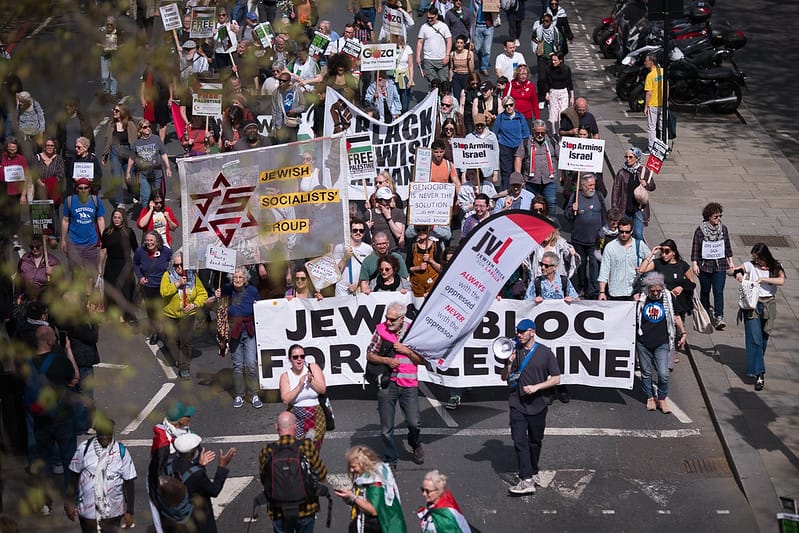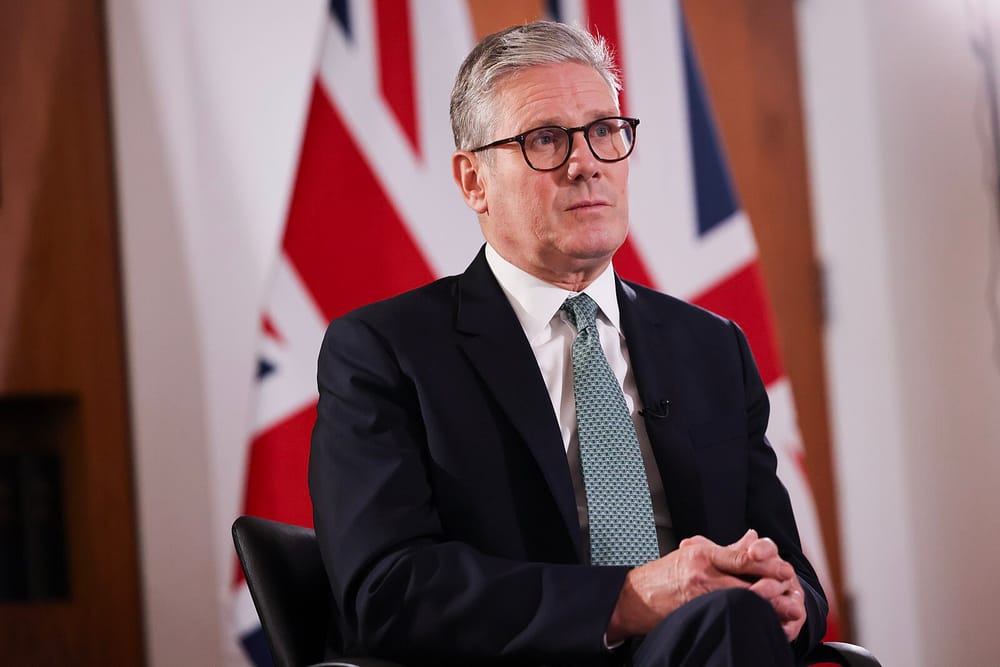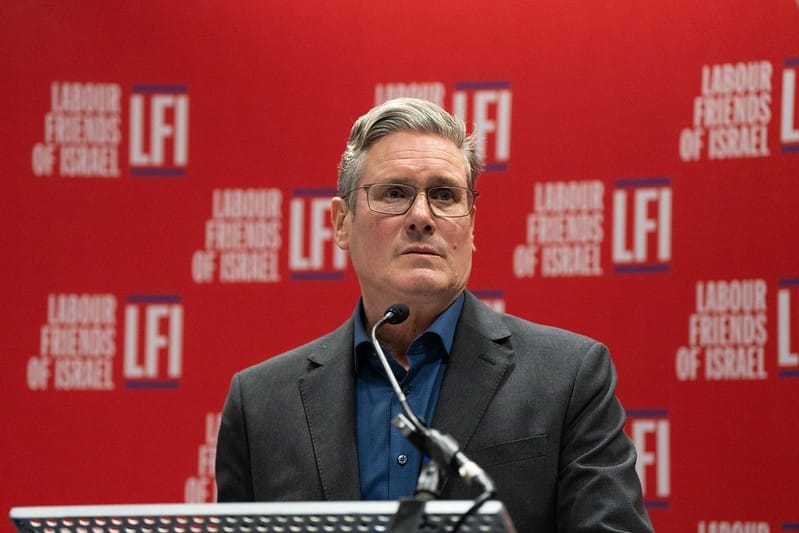‘The choice is one between anti-racism and Zionism as such’
A response to the authors of Facing antisemitism.

The following is a response to Vashti’s interview with Professor David Feldman, Dr Ben Gidley, and Dr Brendan McGeever, authors of Facing antisemitism: the struggle for safety and solidarity. You can read the original interview here.
Since October 2023, hundreds of thousands of Palestinians have been killed or injured in the genocide being carried out by a state which purports to act on behalf of Jewish people the world over. This is being made possible, in part, thanks to direct material support from the UK government and arms industry, along with the endorsement of Jewish establishment bodies such as the Board of Deputies of British Jews. Millions more people have been starved or forcibly displaced from their homes across Gaza and the West Bank, as Israel aims to complete the programme of ethnically cleansing the indigenous population of Palestine, which started over a century ago with British imperial backing.
Rather than prevent or remedy these crimes against humanity, the liberal international order that was formed in the wake of the second world war has shown itself to be utterly ineffective in the face of Israel’s atrocities, perhaps by design. While those seeking justice through the humanitarian legal system that was nominally established to prevent another Holocaust have been maligned as “antisemitic”.
Here in the UK, we have seen government officials collude with the Israeli embassy as they pursue draconian crackdowns on expressions of solidarity with the Palestinian cause. In so doing they have both protected the interests of British capital, and advanced a broader reactionary agenda of restricting the right to protest – all under the guise of protecting “Jewish safety”. Those politicians who have stepped out of line and criticised Israel’s excesses, have been accused of “blood libel”, or barred from entering Palestine by the Israeli authorities on the basis they have “spread hate speech”.
In these circumstances, one might expect organisations like the UK's leading independent race equality think tank The Runnymede Trust to prioritise the most urgent plight of the Palestinian people, and focus resources on combatting the constellation of ethnonationalisms – Zionism being just one in the firmament – that have permeated the political sphere backdropping a genocide being perpetrated in the name of global Jewry.
A contradiction too hard to bear
Runnymede’s commissioning of a new report, Facing antisemitism: the struggle for safety and solidarity, presented an opportunity to confront issues surrounding Jew-hatred within this context. Only by first unpicking the ethnonationalist narrative, and its utilisation of a twisted definition of “antisemitism” to aid and abet the suppression of Palestinian rights, would it be possible to outline a collective “struggle for safety and solidarity” committed to universal liberation from racial prejudice and white supremacy.
Such an approach would have corrected the errors contained in the think tank’s first and only previous report on antisemitism, which failed to parse out the uses and abuses of the term. Published in 1994, A Very Light Sleeper: The Persistence and Dangers of Antisemitism begins with an executive summary setting out an initial “principle” that: “Key distinctions should be made between anti-Judaism, anti-semitic racism and anti-Zionism”. Yet the same paper goes on to claim:
In most political contexts […] – for example in formulations such as ‘Israel has no right to exist’ – it is antisemitic [to deny the legitimacy of the state of Israel] since it denies to Jews what is not denied to other people, namely nationhood and self-determination. Since nationhood is essential to Judaism, this comes close to denying the right of Jews to exist fully as Jews at all.
Thankfully, Facing antisemitism does not repeat these statements nor the further one made in A Very Light Sleeper that a “dimension of anti-Zionism which is usually antisemitic is the notion that Zionism is a racist ideology”. One need only glance at the stream of genocidal words, not to mention deeds, of leading figures from across Israeli society over the past year and a half – or indeed the expressions of those white supremacist non-Jews who make up the majority of Zionists worldwide – to realise it is a system of political thought steeped in racism. Although such sentiments are not something new; they stretch back to the foundations of the settler-colonial project that brought about a state which is de facto and de jure a racist entity.
In their interview with Vashti, the report authors accept there is a contradiction among British Jews, which is “becoming harder to bear”. They contend this comes down to a choice between, on the one hand, a “thoroughgoing anti-racist politics in the UK”, and, on the other, “the current regime in Israel”. In truth, the choice is one between anti-racism and Zionism as such – the Netanyahu administration being just a particular realisation of the latter.
While avoiding passing judgement on Zionism in the report itself – other than in a tacit manner by positively referencing the growing number of “anti- and non-Zionist Jews” (who really knows what is meant by the latter term?) – it would appear from a number of other responses in the interview that they wish to leave open the question of the ideology’s compatibility with anti-racism. Such a position cannot hold: it is simply not possible to be both a Zionist and an anti-racist, nor is it possible to resist racism effectively by embracing unreconstituted racists – to pretend otherwise is to prevent the formation of genuine alliances between groups subjected to the brutalities of ethnonationalism, above all Palestinians.
What’s the scope?
Another problem drawn out in the interview is the authors’ sense of the scope of their own inquiry. There Ben Gidley and Brendan McGeever tell us: “we wanted to focus not so much on the sources of antisemitism but rather its manifestations”, and “[t]his is because the report has a different aim, which is to offer a critical assessment of the politics of state-led ‘anti-antisemitism’ – activity by the state designed to combat antisemitism”. It is puzzling that this delineation is not spelled out explicitly in the report itself. Nevertheless, by glossing over the sources of antisemitism, or the sources of the political contestations over that concept, Facing antisemitism falls short, and ends up relying on unsubstantiated presuppositions that lead to insubstantial conclusions.
For instance, in the first chapter we are told quite correctly: “the well-established and developing partnership between mainstream Jewish organisations and the state, has helped to promote [...] a conflation of antisemitism and anti-Zionism”. But we leave the report without understanding anything about this alliance other than that it exists. At no point are we offered a convincing account of the material interests that underpin the partnership between the British state and Jewish establishment institutions, nor what drives this “vertical alliance” to promote the conflation of antisemitism and anti-Zionism.
The claim made by one of the authors in their interview that “the dominant approach of the Jewish mainstream has been to seek vertical alliances in the form of state protection against antisemitism”, simply begs the question of what is meant by “state protection” and “antisemitism”. It appears they are unwilling to unpick how the conflation allows those parts of the Jewish community aligned with the British state to present grievances over anti-Israel sentiment as “antisemitic” in order to receive “protection” in the form of the repression and delegitimisation of anti-Zionism. Thus it is unclear to what extent the authors believe Jewish safety is genuinely at stake in these “vertical alliances”.
This lacuna ultimately flows from the preconceived notion of the “reservoir of antisemitism”, which is not developed in the report beyond its definition at the outset as: “a repertoire of stereotypes and stories embedded in our common culture that is drawn on in moments of crisis and tension”. In their interview with Vashti, the authors take issue with Joseph Finlay’s criticism, that the reservoir metaphor posits “a relatively unchanging set of discourses that influence society over generations”. Instead, they claim: “in the report, we make clear that the reservoir of antisemitism is not eternally unchanging but continuously renewed”. Unfortunately, this is not the case – nowhere in the text of the report do they explain the process by which that renewal takes place. Indeed, as quoted above, they admit this stands outside their understanding of the report’s scope. Regrettably, the report declines to take as its starting point the class position of Jewish people within a particular socio-political context to make sense of specific instances of Jew-hatred.
These problems around scope and methodology come to a head at the end of the report in the section dedicated to “Antisemitism and the left”. Here the authors uncritically engage with “the Labour Party’s antisemitism crisis between 2015 and 2020”, neglecting the fact that antisemitism-related cases constituted between just 0.06% and 0.3% of the average membership during that period. The report also overlooks the independent inquiry into the matter conducted by Martin Forde KC, which concluded that antisemitism was used as a “factional weapon”. (The barrister was later threatened by Keir Starmer’s party for speaking out about his disappointment that no one from Labour had been willing to discuss the inquiry’s recommendations or the concerns raised by ethnic minority politicians about racism under Starmer’s leadership – the very same leadership that has overseen the UK’s active complicity and collaboration in the Gaza genocide, as well as a domestic agenda revolving around racist and xenophobic attacks on migrants.) Instead, the authors choose to emphasise the idea that “a steady stream of party members and supporters drew from the reservoir [of antisemitism]” while Jeremy Corbyn was Labour leader, which they exemplify by citing the case of a candidate who stood aside in the 2018 Liverpool city council election over social media posts he had made four years previously.
Quite astonishingly, not one single remark is made throughout the entire document about the threat of the contemporary far right. While the authors hark back to the battles against the fascism of the 1930s, they make no reference to the very clear and present dangers of burgeoning rightwing populism, or how this global movement has embraced the “anti-antisemitism” crusade as its own. That a report on antisemitism or “anti-antisemitism” published in 2025 is more concerned with a decade-old tweet (from an account which currently has only a thousand followers), indicates its misplaced priorities, and a fundamental fallacy within its reasoning.
A path away from Zionism
All that is to say, in lacking a thoroughly materialist analysis, the authors’ approach drags them into a domain of discourse shaped and policed by those hegemonic forces intent on distorting antisemitism to advance the ethnic cleansing and genocide of the Palestinian people. This leaves them unable to flesh out a substantive solution for facing antisemitism, and racism altogether, as typified in the report’s conclusion, where we are left with vague aspirations:
This report calls for a new approach to combating antisemitism that is based on building alliances between Jewish people and other racialised minorities. In pursuing this goal we must employ a 360-degree anti-racism. This requires us to confront not only antisemitism but also other forms of racism in the UK, as well as the status and treatment of Palestinians in Gaza, the Occupied Territories and Israel.
If one of the main aims of the report is to encourage Jews to join in the collective anti-racist struggle for safety and solidarity, then the key to this lies in providing a path away from Zionism in toto, not in attempting to absolve the ideology of its essentially racist logic, entertaining the empty notion of “non-Zionism”, or restricting criticism merely to its manifestations in the policies of an Israeli government. Only by repudiating ethnonationalist misconceptions of Jews and antisemitism will Jewish people be in a position to disengage from a “vertical alliance” with the British state, and enter into a “horizontal” anti-racist movement. That is a worthy endeavour; it is a pity Facing antisemitism does not go enough of the way in progressing it.▼
Eli Machover is a PhD candidate in politics at the University of Oxford and an editor at Vashti.
To donate once or monthly, click here.
Author

Eli Machover is a PhD candidate in politics at the University of Oxford and an editor at Vashti.
Sign up for The Pickle and New, From Vashti.
Stay up to date with Vashti.



